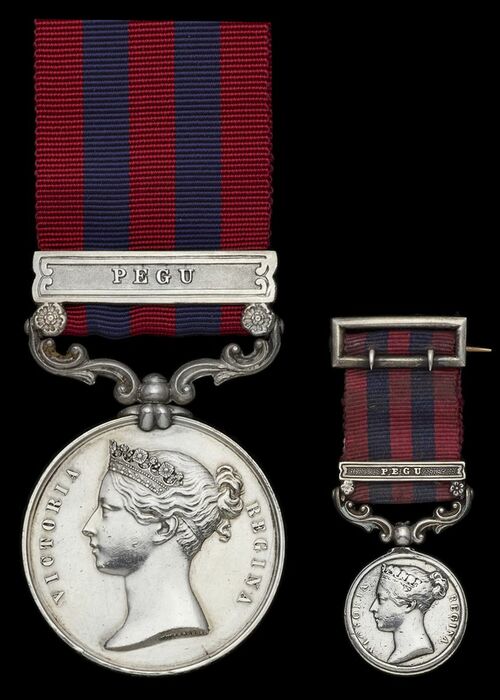
Auction: 24002 - Orders, Decorations and Medals
Lot: 49
India General Service 1854-95, 1 clasp, Pegu (Lieut. John Canavan. 18th Rl Irish Regt); together with a miniature example (John Canavan 18th Rl Irish Regt), engraved, light contact marks very fine (2)
Operations during the Mutiny in India
In a letter from Dr Ffolliott, one of the regimental assistant-surgeons, are preserved a few details of the experiences of one of the detachments. Captain J. Canavan started from Poona on April 23, 1858, with two subalterns and a hundred and twenty of the Royal Irish, a company of Bombay native infantry, camel transport, and dhoolies for the sick and wounded, and at the end of a month's hard marching brought his column to Asseerghur without a casualty and with no sick men. According to Ffolliott, who was in medical charge, this immunity from disease was due to the care taken to keep the men's clothing dry at the numerous fords through which the road ran: the troops were allowed ample time to undress before going into the water, and to put their clothes on again before the march was resumed. Asseerghur was an old native fortress, perched on the top of an almost perpendicular rock rising nearly eight hundred feet out of the plain. As it had never been occupied by European troops, there were no barracks; the men were quartered in an old mosque; while the officers occupied a large bungalow, where they used to entertain a few European ladies who had taken refuge in Asseerghur while their husbands were in the field. Every week there was a dinner-party, followed by a dance to the drums and fifes of the detachment.
On his way to take up the command of a brigade at Mhow, Colonel Edwards was present at one of these entertainments, where he must have been pleased at the determination of his officers to keep up their spirits under the bitter disappointment of finding themselves thus completely "sidetracked". In November, Asseerghur was greatly excited at the report that Tantia Tope was in the neighbourhood. Tantia was one of the few native leaders who had shown good military qualities; he had fought well against Lord Strathnairn (then Sir Hugh Rose) in central India, and after suffering many defeats he took himself to the country north of the Nerbudda, he had evaded the columns threatening him from many directions. The net, however, was now closing in upon him; it was believed he would try to break southwards into the Deccan, and as Asseerghur commanded one of the approaches to this part of India it became a place of temporary importance. One evening the Fort Adjutant bustled into the quarters of the XVIIIth with great news: in a few hours Tantia Tope, with eight or nine thousand men, was going to attack Burhanpore, a rich and populous town not many miles away; Canavan with fifty men of the Royal Irish was to throw himself into the city, and Ffolliott was to accompany him. While Canavan was issuing his orders, Ffolliott went off to make medical arrangements at the hospital, where, to use his own words, "I found every sick man in war paint. My acting hospital sergeant said there was not much the matter with them; they had heard there was to be a fight that night, and wanted to join the party going, so I discharged them out of hospital. Canavan made no distinction; the first fifty for duty were ordered to fall out, and in two hours from the time we were warned we were on the march."
As Canavan and his party were considered to be going on a forlorn hope, every European not on duty was on the parade ground to wish the Royal Irish "good luck" as they moved off, and the ladies were in tears, until their grief was changed to mirth at the discovery that the doctor had filled his pouch, not with medical appliances, but with revolver cartridges. Many of the garrison sat up till dawn, listening anxiously for the burst of fire with which it was feared the detachment would be overwhelmed. But no crash of musketry broke the stillness of the night, and before Canavan reached Burhanpore he learned the place had been reinforced by a larger column, with those movements the Commandant of Asseerghur was unacquainted, and that Tantia Tope had disappeared. As no fighting was expected, Canavan was ordered to return to his own post without delay - another instance of bad luck, for in a day or two there was a sharp skirmish near Burhanpore, in which his company would certainly have taken part.
Subject to 20% VAT on Buyer’s Premium. For more information please view Terms and Conditions for Buyers.
Sold for
£550
Starting price
£550




